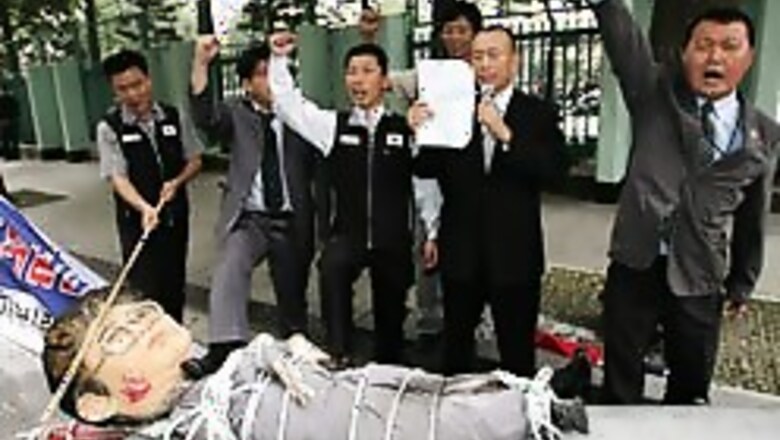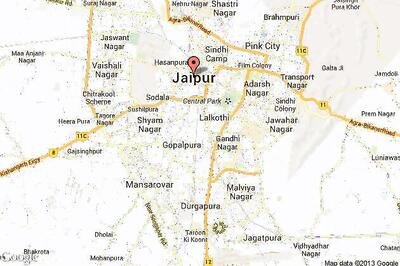
views
Seoul: Officials from Washington to Seoul are raising the spectre of an Asian nuclear arms race if North Korea fulfills its threat to test its first atomic bomb and join the elite club of nuclear powers.
South Korean Vice Foreign Minister Yu Myung-hwan said a test could give Japan a ''pretext'' to go nuclear next, triggering countermoves by suspicious Asian neighbors in a cascade that upends regional security.
While an arms race is unlikely to dawn the day after a test, long-term anxiety abounds.
''There's no equalizer like the bomb,'' said Peter Beck, head of the Seoul office of the International Crisis Group think tank. ''It's safe to say it will lead to an arms race _ will push all the governments in the region to increase defense spending.''
Raising the nuclear stakes from Pyongyang to Tokyo would put some of the world's biggest cities in the shadow of atomic weapons. It might also put nuclear arms in the hands of previously reluctant powers like South Korea or Taiwan.
On a wider scale, North Korea's dabbling with atomic weapons could spur other nuclear powers, including the United States, India or China, to resume their own nuclear testing, a move that raises the risk of proliferation, analysts say.
US Defense Secretary Donald H. Rumsfeld warned Thursday that allowing North Korea to test a bomb would generate far-reaching fallout.
''The lack of cohesion and the inability to marshal sufficient leverage to prevent North Korea from proceeding toward a nuclear program ... it will kind of lower the threshold, and other countries will step forward with it,'' Rumsfeld said.
The current North Korean nuclear standoff dates to 2002, when the United States accused North Korea of conducting a secret nuclear program in violation of a 1994 agreement.
Tensions rose further Tuesday, when North Korea announced its test plans. While it didn't give a timeframe, some predicted a test within weeks if not days.
A top concern is the possibility of North Korea mounting bombs atop missiles aimed at Seoul, Tokyo or even parts of the United States.
While the North's ability to accurately deliver a warhead this way is in doubt, the communist nation shocked the world in 1998 by firing a long-range ballistic missile over Japan into the Pacific Ocean.
PAGE_BREAK
In July it test-launched seven missiles, although a long-range rocket believed capable of reaching American shores exploded shortly after liftoff.
Abhorrence of nuclear weapons runs deep in Japan, where memories of the US atomic attacks on Hiroshima and Nagasaki are burned into the collective consciousness.
But just last month, a think tank run by former Prime Minister Yasuhiro Nakasone proposed in a policy paper that Japan ''consider the nuclear option.''
Tokyo did weigh nukes back in 1995 to counter the threat of a nuclear-armed North Korea. But the government ultimately rejected the idea because it might deprive Japan of US military protection and alarm neighboring countries.
So far, Japan's post-World War II pacifist Constitution keeps its overseas strike ability in check; it has no aircraft carriers, bombers or long-range missiles. But Prime Minister Shinzo Abe, a staunch North Korea critic, wants to amend the Constitution to give Japan's military greater leeway in international action.
If Japan decides to go nuclear, it wouldn't take long to convert the nation's huge stockpile of plutonium from the spent fuel of its nuclear power plants.
That would undoubtedly rattle China and South Korea, which have viewed Tokyo with suspicion since their neighbor invaded and colonized them in the early 20th century.
Both South Korea and Japan have largely relied on the US nuclear umbrella as insurance against attack. But when faced with the verified presence of atomic bombs on the other side of the border, South Korea may consider arming itself.
In 1991, US tactical nuclear weapons were removed from South Korea as part of arms reductions following the Cold War, according to South Korean defense experts. In the same year, the two Koreas signed an accord pledging not to deploy, develop or possess atomic bombs on the peninsula.
But back in the 1970s, Seoul was actively pursuing its own atomic program.
Fearful of a regional nuclear arms race, however, the United States forced then-dictator Park Chung-hee to drop the plan, partly by threatening economic penalties for a nation that was then poor and still recovering from the 1950-53 Korean War.
Shen Dingli, the executive deputy director of the Institute of International Issues at Fudan University in China, thinks Japan and South Korea are unlikely to seek nuclear arms today for many of the same reasons.
''This is bound to erode their alliance with the United States, thus subjecting the East Asian security situation headed by the US to even greater challenges,'' he wrote in a report on North Korea's latest threat. ''The chances of Japan and South Korea developing their own nuclear programs are not great.''
But other countries might still use North Korea's test as an excuse to build atomic arsenals, says Ralph Cossa, president of the Honolulu-based Pacific Forum.
''If North Korea is 'justified' because it faces a threat from a bully superpower, Taiwan can make the same argument,'' Cossa said.
''Let's not overlook Southeast Asia either. Burma is talking about obtaining a research reactor and both Indonesia and Vietnam are exploring nuclear energy options, although these dominos are a long way from falling,'' he added.


















Comments
0 comment